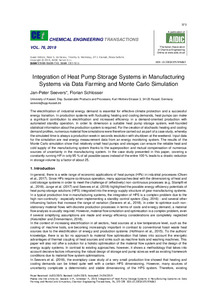Date
2019Subject
620 Engineering EnergiebedarfFertigungssystemWärmepumpeWärmespeicherungMaterialflussSimulationMonte-Carlo-SimulationMetadata
Show full item record
Aufsatz

Integration of Heat Pump Storage Systems in Manufacturing Systems via Data Farming and Monte Carlo Simulation
Abstract
The electrification of industrial energy demand is essential for effective climate protection and a successful energy transition. In production systems with fluctuating heating and cooling demands, heat pumps can make a significant contribution to electrification and increased efficiency in a demand-oriented production with automated standby operation. In order to dimension a suitable heat pump storage system, well-founded statistical information about the production system is required. For the creation of stochastic heating and cooling demand profiles, numerous material flow simulations were therefore carried out as part of a case study, whereby the simulated time is always a production week in seconds resolution with shutdown at the weekend. Input data for the simulation are real energy measurement data from an energy monitoring system. The results of the Monte Carlo simulation show that relatively small heat pumps and storages can ensure the reliable heat and cold supply of the manufacturing system thanks to the superposition and mutual compensation of numerous sources of uncertainty in the manufacturing system. In the case study presented in this paper, covering a constantly running HP in only 95 % of all possible cases instead of the entire 100 % leads to a drastic reduction in storage volume by a factor of about 25.
Citation
In: Chemical engineering transactions (CEt) Volume 76 (2019) , S. 373-378 ; EISSN 2283-9216Citation
@article{doi:10.17170/kobra-202012092467,
author={Seevers, Jan-Peter and Schlosser, Florian},
title={Integration of Heat Pump Storage Systems in Manufacturing Systems via Data Farming and Monte Carlo Simulation},
journal={Chemical engineering transactions (CEt)},
year={2019}
}
0500 Oax
0501 Text $btxt$2rdacontent
0502 Computermedien $bc$2rdacarrier
1100 2019$n2019
1500 1/eng
2050 ##0##http://hdl.handle.net/123456789/12209
3000 Seevers, Jan-Peter
3010 Schlosser, Florian
4000 Integration of Heat Pump Storage Systems in Manufacturing Systems via Data Farming and Monte Carlo Simulation / Seevers, Jan-Peter
4030
4060 Online-Ressource
4085 ##0##=u http://nbn-resolving.de/http://hdl.handle.net/123456789/12209=x R
4204 \$dAufsatz
4170
5550 {{Energiebedarf}}
5550 {{Fertigungssystem}}
5550 {{Wärmepumpe}}
5550 {{Wärmespeicherung}}
5550 {{Materialfluss}}
5550 {{Simulation}}
5550 {{Monte-Carlo-Simulation}}
7136 ##0##http://hdl.handle.net/123456789/12209
<resource xsi:schemaLocation="http://datacite.org/schema/kernel-2.2 http://schema.datacite.org/meta/kernel-2.2/metadata.xsd"> 2020-12-15T17:31:24Z 2020-12-15T17:31:24Z 2019 doi:10.17170/kobra-202012092467 http://hdl.handle.net/123456789/12209 eng Urheberrechtlich geschützt https://rightsstatements.org/page/InC/1.0/ 620 Integration of Heat Pump Storage Systems in Manufacturing Systems via Data Farming and Monte Carlo Simulation Aufsatz The electrification of industrial energy demand is essential for effective climate protection and a successful energy transition. In production systems with fluctuating heating and cooling demands, heat pumps can make a significant contribution to electrification and increased efficiency in a demand-oriented production with automated standby operation. In order to dimension a suitable heat pump storage system, well-founded statistical information about the production system is required. For the creation of stochastic heating and cooling demand profiles, numerous material flow simulations were therefore carried out as part of a case study, whereby the simulated time is always a production week in seconds resolution with shutdown at the weekend. Input data for the simulation are real energy measurement data from an energy monitoring system. The results of the Monte Carlo simulation show that relatively small heat pumps and storages can ensure the reliable heat and cold supply of the manufacturing system thanks to the superposition and mutual compensation of numerous sources of uncertainty in the manufacturing system. In the case study presented in this paper, covering a constantly running HP in only 95 % of all possible cases instead of the entire 100 % leads to a drastic reduction in storage volume by a factor of about 25. open access Seevers, Jan-Peter Schlosser, Florian doi:10.3303/CET1976063 Energiebedarf Fertigungssystem Wärmepumpe Wärmespeicherung Materialfluss Simulation Monte-Carlo-Simulation publishedVersion EISSN 2283-9216 Chemical engineering transactions (CEt) 373-378 Volume 76 false </resource>
The following license files are associated with this item:
Urheberrechtlich geschützt

